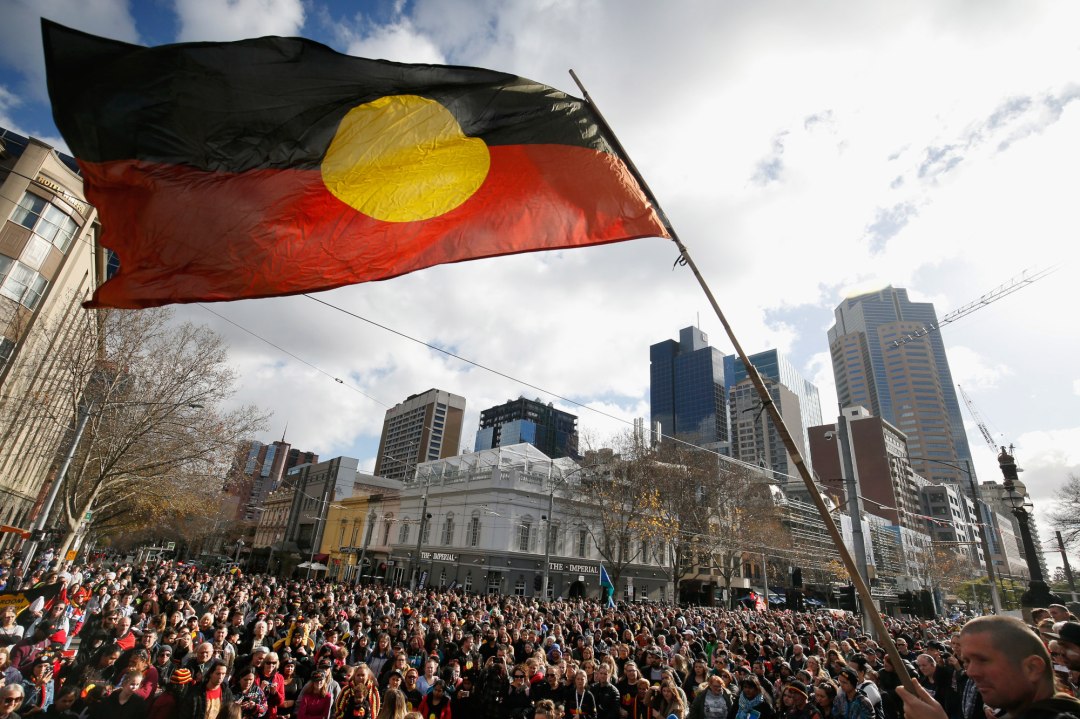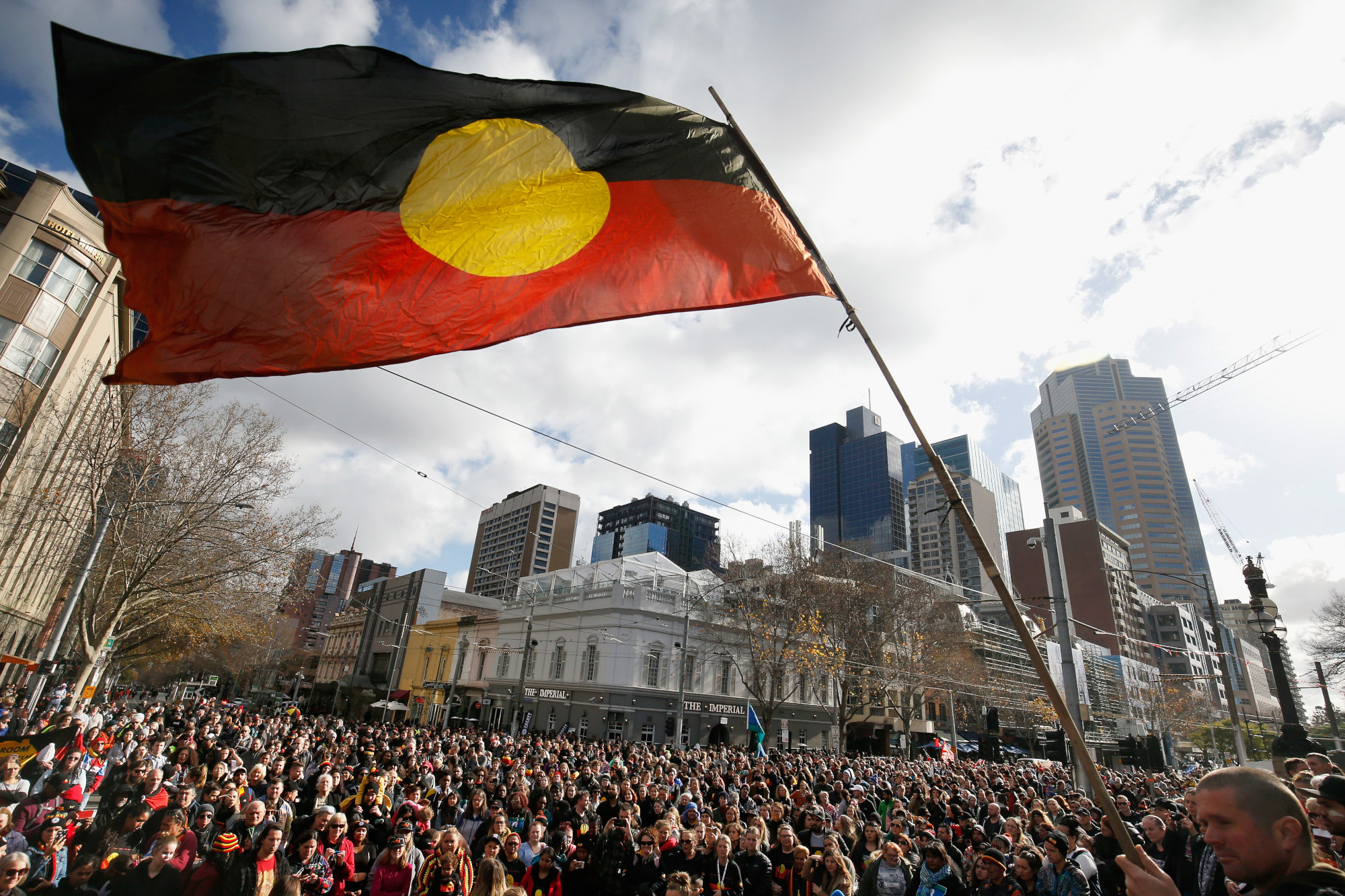On Tuesday evening, my six-year old’s suburban Melbourne primary school staged a wonderful concert, an all-school celebration of contemporary song, dance and collaboration.
It was, however, preceded by an elaborate Acknowledgement of Country and Aboriginal Australians, in which a group of children led incantations to the ‘Old Ones’ that the rest of the school echoed in a mystical Gregorian-like chant. For the audience, it turned the theatre into a cathedral, as if we were witnessing a sacred rite – which, to the primary school children inculcated in its sacredness, it was.
The 65,000 people who identify as Aboriginal, out of over seven million Victorians, will be given rights, privileges and institutions setting them above the rest of the population
Earlier the same day, it was finally confirmed by the state government of Victoria that the schoolchildren’s obeisance to Aboriginal people and culture is being transformed into a radical remodelling of how the state will be governed. Just as the children’s invocation became the centre of their performance, the needs and priorities of the just 65,000 people who identify themselves as Aboriginal, out of over seven million Victorians, will not only be placed at the centre of Victoria’s governance, but give them rights, privileges and institutions setting them above the rest of the Victorian population.
On Tuesday, Victoria’s radical Labor premier, Jacinta Allan, finally unveiled what has been years in the making: a ‘Treaty’ between the State of Victoria and the First People’s Assembly of Victoria, an elective body established by the state government exclusively for this purpose. Simultaneously, enabling legislation was introduced to Victoria’s parliament, a monster 288-page bill to implement the Treaty’s heads of agreement, establish permanent governance institutions for Aboriginal Victorians, and define the relationship between these institutions and Victoria’s government, parliament, and bureaucracy.
Because Allan has a crushing absolute majority in the lower house of the parliament, and a left-wing majority in the upper, the legislation is expected to pass quickly with relatively little scrutiny, in time for a year’s end formal Treaty signing. The state’s conservative opposition is against it, but doesn’t have the numbers to stop or amend it.
The Treaty boils down to enshrining, in Victoria’s governance, the prevailing white guilt narrative that European settlement brought with it only genocide, violence and dispossession for native peoples. The preamble of the Treaty document, in prose of the deepest purple, asserts:
‘This Statewide Treaty honours the unbroken relationship of First Peoples to Country, and to Aboriginal Lore, Law and Cultural Authority. These obligations have been carried faithfully since the first sunrise. The ancient stories of these lands, waters, skies and stars still speak to those willing to listen – and the more we come to know them, the better we can care for Country together.’
Well and good, but this so-called Treaty is so much more than that. A permanent First People’s Assembly, given a catchy Aboriginal language name, effectively will be a de facto third chamber of the state’s parliament, with power to intervene in any matter it deems affects its Aboriginal constituency. It will have statutorily guaranteed direct access to the premier, cabinet, heads of government departments and the chief commissioner of police.
Another arm of the Treaty apparatus will monitor government’s performance in implementing policies and programmes benefiting Aboriginal Victorians and will, like the committee of a Pall Mall club, be empowered to determine what constitutes eligibility for membership of the Aboriginal community. It also will be given primacy over deciding geographical place names, so the renaming of rivers, mountains, and national parks will soon follow.
A third arm amplifies ‘truth-telling’ of the Aboriginal experience since Europeans first colonised Victoria almost 200 years ago. There’s no Nigel Biggar-like acceptance that much good came with colonialism along with the bad: no, it’s all about defining the original sin staining Victoria’s soul, thereby justifying both the Treaty’s huge concessions to contemporary Aboriginals, and the accompanying massive bill of establishment costs and de facto reparations: more than half a billion Australian dollars (£243 million) over the next five years, on top of the A$380 million (£185 million) spent to date.
The agreement also decrees that Victorian children, from nursery school onwards, are to be taught ‘truth-telling’, based on Aboriginal testimonies before a special commission that fed the Treaty process. Not an absolute or objective truth, but unquestioned, Meghan Markle-style ‘their truth’. It suits the government and Aboriginal activists to entrench and perpetuate the narrative of Aboriginal victimhood, even to the point of burdening four-year-olds with the attributed sins of their British forefathers. There are no shades of grey in this story, it seems, only (literally) black and white.
Victoria’s premier Allan insists this is not a version of the national Aboriginal Voice to Parliament that was crushingly rejected in a constitutional referendum in 2023. Indeed it isn’t: that Voice merely sought to guarantee Aboriginal input into federal government decision-making in certain cases. It may not be included in the state’s written constitution, but this Treaty creates effective co-governance, and a special status, for a very small proportion of the state’s population.
Recognising the consequences for Aboriginal Victorians of the last 200 years, and seeking to improve their current lot, is one thing. Imposing a complex Treaty based on permanent Aboriginal victimhood, conferring rights and privileges far beyond those of other Victorians, is another. However well-meaningly, Victoria’s democracy is being undermined, and the identity of Victorians themselves is being transformed. For years now, the state’s flag has been banished in favour of the Aboriginal activist banner; now the machinery of government follows suit.
The imported Canadian term, ‘First Peoples’, is intended to imply Aboriginal people were here first. In Victoria, here it now means they come first, before all other Victorians.
At least with the Voice, Australians voted on it. In Victoria, these far more sweeping and radical plans were kept secret until the last possible moment, and the state’s compliant parliament will rush them through. Good intentions have gone feral, leaving seven million Victorians voiceless.








Comments